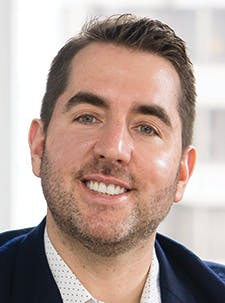Mentorship makes me think of a book that was read to me growing up, Are You My Mother? by P. D. Eastman. In the story, a small bird hatches inside a nest with no other bird around. Instinctively, the bird knows there should be someone who will show him the ropes, so he goes around looking for the right person to help him.
New dentists in the real world are a lot like that bird. They are BADs (baby-aged dentists). My goal is to encourage more MADs (medium-aged dentists) and SADs (seasoned-aged dentists) to connect with their new colleagues in dentistry and help them. (Disclaimer: I’ll be using some of my nacho-inspired terminology in this article.)
The term I use to describe mentorship is key resource. For the BADs reading this, there are many different kinds of key resources available to you. For starters, there are on-site mentors who practice in the office with you. This is the ideal situation, as you can ask questions in the heat of dentisting and receive immediate feedback, whether it’s when a crown has light contact (hint: use thicker floss . . . rope can be floss . . . just kidding) or when patients holding their brand-new iPhones are upset about $8 copays. On-site dentists can give you real-time advice and help you navigate through these issues when you really feel like crying inside. Please understand that dentists are not allowed to show their true emotions in the office, so you have to keep your crying on the inside. It’s like being the star of a Broadway play that no one wants to see. Basically, it’s the exact opposite of starring in Hamilton . . . consider yourself Bizarro Lin-Manuel, DDS.
Although on-site mentoring is the most ideal kind of mentoring, it is rare. Most dentists work by themselves, and the ability for a solo general practitioner to add an associate to the practice is challenging. But have no fear! There are other types of key resources available, and although they may not be in person, they are often accessible with the help of technology.
For example, in our two offices, we have text mentorship. It works like this: in our second location, our awesome associate texts us questions during the day that we can answer. So, who is your text pen pal? Who is your go-to person in your phone? Things happen.Your dental nachos are going to go sideways, and you won’t know what to do. Who can you text for advice, or even someone who can say, “That has happened to me too! Here’s what I would do. Here’s a way to work this out . . . ”?
Email works the same way! And there are LinkedIn pages and Facebook groups, too. My Facebook group, Dental Nachos, is full of questions, queries, comments, and surveys. Dentists are very willing to share feedback, advice, and experiences. It requires little of anyone’s time, and I hear repeatedly how beneficial people find it.
Any connecting platform can be used in a mentoring capacity. All it requires is a professional who is willing to ask for help and another to provide answers. That is the beauty of mentorship. So much dental goodness can be shared by simply making yourself available for others.
So, we have text mentorship, we have phone mentorship, we have email mentorship, we have Facebook mentorship, we have Instagram mentorship, we have LinkedIn mentorship . . . we have all kinds of ways. The key to BADs finding key resources, however, is their developing and building relationships. That means you BADs have to get your faces out there, and not just on Facebook.
How can you do this? Explore ways to connect with the dental industry as an engaged participant. In-person continuing education (CE) is critical for you to meet more MADs and SADs. The CE speaker is not always great, and the food can be “meh,” but go anyway. That MAD sitting next to you might need an associate. That SAD in front of you might be looking to sell his practice.
In general, people love to help babies of all types, from newborns to BADs. But you BADs have to put yourself in the right space to get help. To reference Hamilton again, it’s just as in the song titled, “The Room Where It Happens.” Young dentists must put themselves in the room where these things happen.
Where are these rooms? Great question! There are CE courses in your local area. There are amazing CE weekends across the country run by leaders in dentistry. And there are other live social networking events. Show up, share your story, observe the room, and engage. (Then, fit in “you time” to see the sights and eat local dishes while you’re there!)
I know. These CE events cost money. But just as dental school was an investment, so too are these. They’re an investment in the career that took you many years to start. You’ve done the hard part, and now is your chance to kickstart your professional development.
With loans to pay off, it is extremely valuable to find someone who can help you through your first few years on the job. This is actually the thing that will help you get yourself out of debt. It will also be the reason why you’ll learn new procedures and advance quicker. But more importantly, you will meet new people who can change your life.
To the MAD and SAD key resources out there, I ask this of you: When you go to CE or networking events and you see young dentists, open the conversation. Go up to them and say, “Hey, tell me a little bit about what you’re doing in dentistry.” Or, “Dentistry can be a rewarding but exhausting career. When I was in your shoes, I was apprehensive, too. I didn’t know if I could pay off my loans. But you will get there with hard work!”
Offer to exchange contact info. Be that key resource you had (or wish you had) early in your career. Pay it forward. It will benefit you, too. More JBN (just being nice) is the treatment plan we need for our dental industry.
NACHO Treatment Plan
Let’s sum things up for everyone. For key resource development, follow these three steps:
1. Go to more local and national CE courses.
2. Use the internet to connect through LinkedIn, Facebook groups, etc.
3. Look to connect in a meaningful way with more senior dentists in your area. If you are a BAD, offer something to your mentor. Remember, your mentor spent most of his or her life in an analog world. Show them how to use Instagram, upload photos, etc. Take your mentor to the digital age!
Remember, BADs, you’re there for your key resource, too. When you meet the right mentor, mentor magic happens. Just as the little bird knew when a bird returned to the nest, it was indeed his mother.
One of my favorite Dr. Nacho sayings is: “Everything that matters needs a system, and everything matters. This applies to life, dentistry, and connecting with key resources. The more dentists who connect as friends and colleagues, the better a dentisting world we can build for all of us!”
About the Author
Paul Goodman, DMD
Paul Goodman, DMD, is a practicing general dentist and managing partner with his brother, Jeffrey, of a group practice in Mercer County, New Jersey. Over the past 10 years, Dr. Goodman has acquired three dental practices and transformed his father’s general practice into a dental group that employs four general dentists, two specialists, and more than 20 team members in two locations. After graduating from the University of Pennsylvania School of Dental Medicine in 2002, he pursued additional training at Albert Einstein Medical Center in Philadelphia, Pennsylvania. During his general practice residency and hospital fellowship there, Dr. Goodman had the opportunity to learn how to place and restore dental implants. He has a passion for teaching, speaking, and giving back to the dental community. He is the founder of the Rising Dentists Study Club in Philadelphia and an active member of Alpha Omega. Dr. Goodman lectures on practice management to the dental students at the University of Pennsylvania. He lives with his wife and three-year-old daughter in Center City, Philadelphia.
Read Dr. Goodman's DE Editorial Advisory Board profile here.


